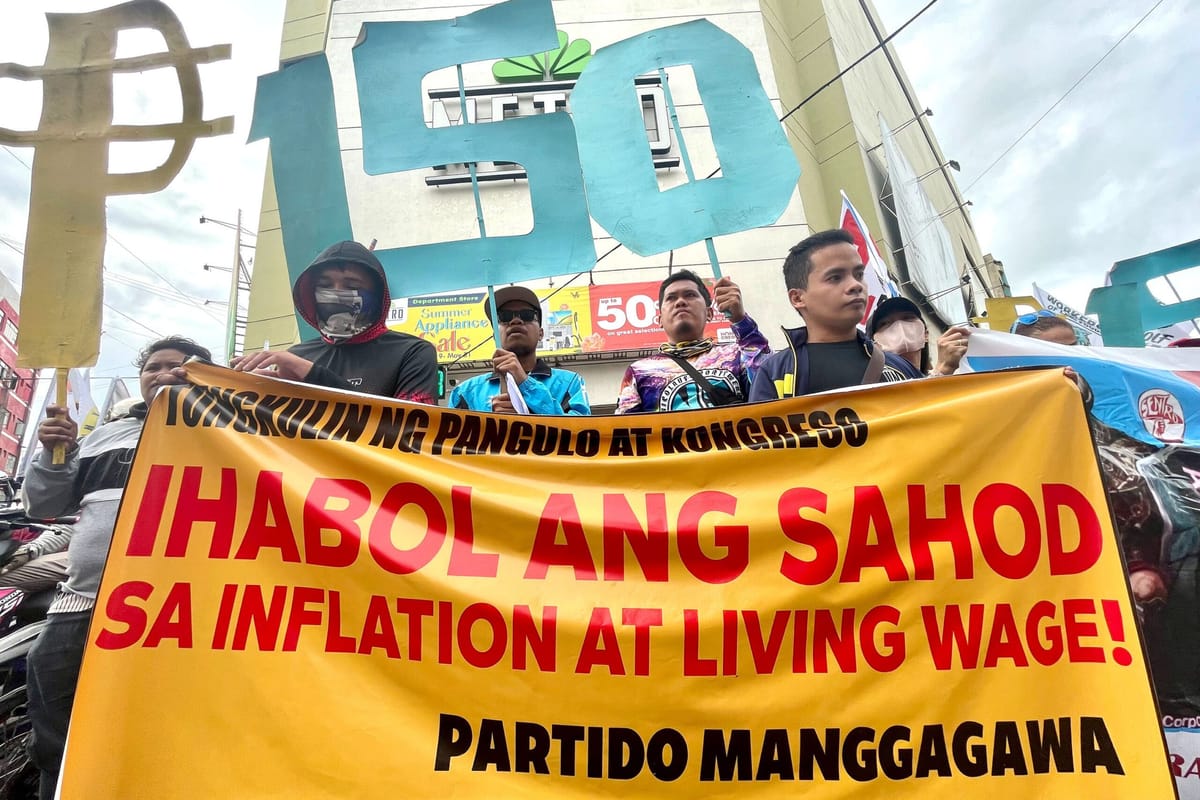Regional wage boards to come up with plans to increase minimum pay

Source: Rappler
Author: Michelle Abad
MANILA, Philippines - The National Wages and Productivity Commission has directed regional wage boards to come up with action plans to comply with President Ferdinand Marcos Jr.'s order to review Philippine workers' minimum wages, NWPC Executive Director Criselda Sy said on Wednesday, May 8.
"We are issuing a resolution directing the regional boards to already come up with their action plans to respond to the instruction of the President," Sy said in a House labor committee hearing on Wednesday.
On Labor Day, May 1, Marcos ordered the Regional Tripartite Wage and Productivity Boards (RTWPBs) to initiate a "timely review" of minimum wages in their respective regions, factoring in the impact of inflation, within 60 days prior to the anniversary of their latest wage order.
Within the past year, all regions have granted increases in their minimum wages. Sy said that the oldest wage order currently being implemented is the one for Metro Manila, which has been effective since July 16, 2023. It granted a daily minimum wage of up to P610.
This means that the soonest time the Metro Manila wage board would commence a review is on May 16, Sy said.
"We hope [the Metro Manila RTWPB] can provide us with their action plan within this week or next week so that when they commence the review we can inform [and] update the President about the progress," said Sy.
Sy reported this during a House panel hearing on the various bills proposing an across-the-board increase for minimum wage earners in the private sector. While the Senate has approved on third and final reading the version that seeks to grant a P100 increase, House lawmakers continue their deliberations.
The Wednesday hearing made space for positions from the labor sector, employer sector, academe, and government, although their arguments had already been brought up in previous hearings. Sentiments were consistent - labor leaders highlighted the need for workers to have higher salaries in light of "poverty wages" being set by regional wage boards, while employers said it would be difficult to afford.
The NWPC was one of the institutions to highlight the negative impacts of a national wage increase. Sy said that since the proposed wage increases did not seem to replace the regional wage board system, the imposition of an across-the-board increase would "create confusion and a negative impression among local and foreign investors."
"Adding another layer of wage determination could make it difficult to predict future wage policies. This unpredictability in wage policies can create instability and uncertainty in the business environment in the country," said Sy.
She also said that the increasing minimum wages from P100 to P750, as proposed in the different bills, would narrow or eliminate the gap between minimum wages and average wages, which is "crucial" for negotiating better working conditions.
Other concerns raised were how a minimum wage increase could hurt micro, small, and medium enterprises, which comprise the bulk of the economy. The panel earlier had discussions on how government subsidies could be provided for businesses that would not be able to handle the increase.
Gabriela Representative Arlene Brosas, one of the authors of the version of the bill seeking a P750-increase, said that it was time for the House to make a decision.
"Let's not keep the workers waiting anymore. Ito na ang opportunity para sa isang significant wage increase.... Hindi na sumasapat 'yung regional tripartite wage board eh, kasi 'yun na sinasabi nila, kaunti-kaunti lang, dumating na sila sa punto na hinihingi at hinihiling na nila ito dito mismo sa atin," she said.
(This is our opportunity to grant a significant wage increase.... The wages set by the RTWPBs are no longer enough, because they say they only get increments. They've reached a point where they are asking for an increase from us at no less than the House.)
IBON Foundation consistently finds disparities in most regions in their family living wage, or the wage needed for a family of five to live comfortably, and their actual minimum wage. For instance, Metro Manila has the highest minimum wage at P610, but the family living wage as of March is P1,197.
In this year's Labor Day protests, labor groups focused on the wage hike proposals in Congress.
The Philippines' unemployment rate rose to 3.9% in March, equivalent to around 2 million jobless Filipinos, the Philippine Statistics Authority (PSA) reported on Wednesday. This is higher than the 3.5% reported in the previous month.
The PSA also reported that inflation inched up to 3.8% in April, hurting poor households and areas outside Metro Manila mainly due to the spike in rice prices, El Niño damage on crops, and the peso's depreciation against the dollar.
Social Weather Stations also found that 14.2% of Filipino families in March were hungry or had nothing to eat at least once in the first quarter of 2024 - up from 12.6% in December 2023. - Rappler.com
